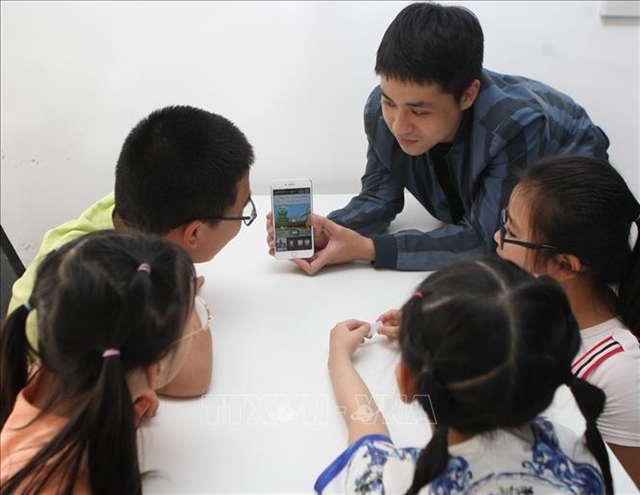 |
| Children need guidance from adults to utilise the Internet's benefits and avoid safety issues. — VNA/VNS Photo Thanh Tùng |
For young people born after 2000, the use of smartphones, tablets or any other devices with Internet connectivity has become a widespread and ingrained part of everyday life.
Although the use of internet can provide access to a lot of benefits, risks involving harmful content and safety issues still linger, and experts advised that parents should educate children with proper skills so that kids can both enjoy the benefits as well as avoid risks while browsing the internet.
Internet is ubiquitous
According to data from the Department of Information Security under the Ministry of Information and Communications, currently, Việt Nam has about 24.7 million children, accounting for 24.5 per cent of the population, of which two-thirds can access internet-connected devices.
Data also shows 93 per cent of children aged 14-15 and 82 per cent of children aged 12-13 use the internet daily to meet daily needs such as studying, entertainment, making friends, and sharing information.
"Entering the digital age, smart devices and the internet have become two indispensable elements of everyone's daily life. For children, the internet helps enhance connectivity, interaction, and provides numerous learning opportunities, especially for children in remote areas," said Vũ Việt Anh, Director of Success Academy.
"Importantly, it's not just a learning tool but also an entertainment medium that children prefer over many other types of toys. However, we must also address the clear drawbacks that the internet brings to children," Việt Anh added.
According to a survey on online safety conducted by Google in 2022, the average age at which Vietnamese children own a phone is 9 years old, while the global average is 13. Another survey by the Department of Children (Ministry of Labour, Invalids and Social Affairs) found that many children use devices to access social media for five to seven hours every day.
 |
| Nguyễn Phương Linh, Director of the Institute for Sustainable Management and Development (MSD). — Photo qdnd.vn |
"The age at which children use the internet is decreasing to six to seven years old, with 87 per cent of children aged 12-17 using the internet at least once a day. Concerningly, up to 40 per cent of children feel unsafe, and over 70 per cent of children have had unwanted experiences while using the internet," said Nguyễn Phương Linh, Director of the Institute for Sustainable Management and Development (MSD).
According to a survey of households in the research project 'Preventing Harmful Behaviors in Việt Nam', around 87 per cent of children aged 12-17 use the internet daily, but only 36 per cent of them know how to ensure online safety.
Many experts have said that children using internet-connected mobile devices bring numerous benefits. However, early and prolonged exposure can harm a child's brain, limiting real-world experiences.
Moreover, children can develop dependencies on smart, internet-connected devices, becoming addicted to online games and entertainment, leading to various consequences as reported by the media. How to help children harness the benefits and avoid the pitfalls of the internet is a concern for parents, schools, and society.
Parental guidance
Discussing ways to help children make the most of useful information while avoiding harmful content on the internet, Bùi Lê Chí Bảo, CEO of Selfomy Educational Technology Company, affirmed: Parents need to become friends and companions to their children during their exposure to social media.
When children are still young and first encounter smartphones and internet-connected tablets, parents should accompany them, guide them on which applications to use and which ones to avoid. It's essential to establish principles for children when using phones, such as sitting posture, screen time, and the programs they can watch.
If parents have limited internet experience or time to spend with their children online, they can consider choosing solutions from service providers, equipping their children with skills, or enrolling them in appropriate courses that promote using the internet for beneficial purposes and guard against harmful content.
"Instead of restricting children from using smart devices, it's advisable to provide more solutions and ways to access useful information online," said Bảo.
According to Linh, parents need to accompany and help children interact positively and creatively in the online environment, based on six principles: respecting and acknowledging children's right to access and use the internet; starting to accompany children in safe internet use as early as possible; respecting children's privacy and participation rights; understanding the psychology and development of children to provide suitable support; guiding children to access support when needed; and being ready to provide assistance when children require it.
In addition to parents, adults in the family, in schools and educational institutions should pay significant attention to equipping children with life skills, including internet safety.
 |
| Trần Đăng Khoa, Deputy Director of the Department of Information Security. —VNA/VNS Photo Minh Sơn |
According to Trần Đăng Khoa, Deputy Director of the Department of Information Security, children are most vulnerable to online social risks from the ages of nine to 13.
Therefore, to help students gain more skills in information security, the Department of Information Security has collaborated with schools and various organisations to organise the Student Internet Safety Competition.
Through this competition, knowledge and skills for safe and effective internet use will be provided to students and parents nationwide. It's also a healthy and beneficial platform that enhances students' critical thinking abilities, helping them identify and prevent safety risks in the online environment.
Furthermore, the Child Online Protection and Rescue Network coordinated by the Department of Information Security, in collaboration with several other organizations, has recently launched a website at https://vn-cop.vn with various features aimed at safeguarding children on the internet. On the website, features such as "Resources" provide materials to enhance awareness, skills, and experience in protecting children online.
Features like "Q&A" and "Expressing Concerns" provide a space for children and users to ask questions, express opinions, and voice concerns regarding child protection on the internet. Recently, the Department of Information Security has tested the "Tool" and "Report Abuse" features to assist users in checking unsafe links. Users can input the website link and request a safety check for children or report abuse when encountering cases of child exploitation, harassment, fraud, bullying, or any harmful behaviour toward children to the relevant authorities.
To keep up with the rapid changes in technology, children need to learn and have appropriate access to digital technology. They must also be equipped with digital skills to build resilience and the ability to respond effectively to risks in the online environment. Alongside this, the support of families, guidance from schools, and technological assistance from corporations and regulatory agencies will help create a healthier online environment for children to learn and grow. — VNS